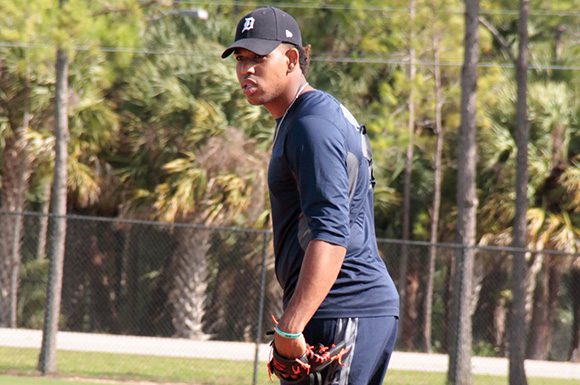LAKELAND, Fla. — For Tigers ´prospect Edgar De La Rosa, the Major League Baseball´s signing system is inaccurate in some countries.
The second day in July of every season represents the time when teams are allowed to finally make contract proposal to future baseball stars. Signing bonuses became a legitimate way to put a price to a kid´s talent. The higher the signing bonus should coincide with the player´s skill level.
On the other hand, July 2nd is also a date where some dreams are broken and some lives take a 180-degree turn.
In the Dominican Republic, kids drop books to grab a baseball and pursue the dream of becoming a professional baseball player.
“In my country you can see kids, who do not know how to write, playing baseball on the streets,” said Edgar De La Rosa in Spanish.
Sports have become a passport to escape from the poverty in the Dominican Republic. At the age of 13, boys move away from their families to become a training machine for major-league teams.
“I am from El Seibo, a very poor city, where baseball was not so popular, that is why I decided to move to San Pedro de Macoris when I was 15 years old, and I stayed there until I was 18 years old,” said the 24 year-old pitcher.
Baseball players put their talents into a trainer who covers all the necessary training expenses in exchange for a cut of the signing bonuses of the players.
“I was living in a homestay with a man that I consider him as my father named Rafael Fernández,” explains De La Rosa.
According to De La Rosa, Fernández has experience turning young talented Latin-Americans into professional baseball players, with the biggest player on his resume being former Montreal Expos third baseman Fernando Tatis.
The training these kids go through demands a full-time commitment, leaving no time for books and homework.
“I woke up at 5.45 a.m. At 6 a.m., I had to be at the pier to start running with a physical trainer named Chichi, a former Dominican boxer,” said De La Rosa, who was also drafted by the Dominican Winter League Team Estrellas de Oriente.
“We worked out together from 6 a.m. to 8 a.m. After that, I had to eat, I mostly had to eat cow´s liver with don plin, it is like boiled dough, plantain and other stuff. After the breakfast, I used to take a nap until midday, then I went back to train until late afternoon,” said 16th-ranked Detroit Tigers prospect Edgar De La Rosa.
After doing that for three years, De La Rosa was ready to attend tryouts in an effort to draw attention from any of the MLB team scouts.
At the age of 17, when he decided to show his skills, De La Rosa`s talent was valued at $700,000 US.
”I was just a boy. Do you know how fast my fastball was when I was at that age? (It’s) 84 (mph). So at that age nobody can tell you are not going to be a ballplayer,” said De La Rosa, whose favourite MLB player is closer Aroldis Chapman of the Cincinnati Reds.
“I started throwing over 100 when I was 21,”
The member of the Lakeland Flying Tigers has his own point of view about how talent is developed.
“The Latin-American baseball player develops his entire potential at the age of 19 or 20 years old. At the age of 16 you will not be able to see their entire talent,” said De La Rosa at the Joker Marchant Stadium.
However the MLB system does not work the same way with every country in the region.
“(MLB teams) can sign players at the age of 21. Cubans are signed at 22 years old and go straight to the big leagues,” said De La Rosa, who admires Blue Jays short stop José Reyes, a Dominican Republic native.
“Why do they (teams) not do the same with Dominicans and Venezuelans?”
Follow me @AlexisELucena

